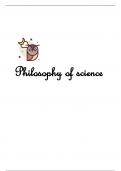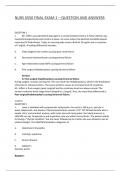Summary
Summary - Philosophy of Science
- Course
- Institution
This is an in-depth and detailed summary of the lectures for Philosophy of Science. It is written in a way that's easy to read, and the main concepts are highlighted. Besides the notes, it contains a mini quiz at the end of each lecture and an overview of all the 'main actors' from the first part ...
[Show more]




